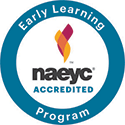Early Childhood Education A.A.S. (ECE)
Earn your Associate Degree in Early Childhood Education from LCCC.
What is an Associate Degree in Early Childhood Education?
This program prepares the graduate to work with children aged birth through nine. Students who complete the A.A.S. in Early Childhood Education are qualified as a group supervisor or head teacher in an early care and education program, including Head Start classrooms and childcare centers with children in infant/toddler, preschool or school-age care. With additional experience, graduates can be qualified to be Center Directors. Students who transfer to Bachelor programs work towards Pre-K to fourth grade teacher certification for employment in early childhood or elementary school settings.
The Early Childhood Education A.A.S. (ECE) at LCCC  is accredited by the Commission on the Accreditation of Early Childhood Higher Education Programs of the National Association for the Education of Young Children.
is accredited by the Commission on the Accreditation of Early Childhood Higher Education Programs of the National Association for the Education of Young Children.
Early Childhood Education Courses
In this program, you’ll take classes such as:
- Children’s Growth and Development
- Integrating the Arts and Play in Early Childhood
- Integrating Curriculum in Early Childhood
- Communities and Family
- Advanced Fieldwork
Course Fees
Pathway to a Career in Early Childhood Education
Advance your career at your own pace. Each step below transfers credits to the next. Appropriate job titles and average pay ranges are meant to help guide an individual interested in this field; they vary based on individual experience and employer.
Associate Degree
Early Childhood Education A.A.S.
Lehigh Carbon Community College
- Lead Teacher
- Group Supervisor
- Home-Based Teacher
- Director (with ECE Director’s Credential)
Wage information taken from Lightcast Q1 2024 BETA Data Set – QCEW Employees. Wage range is 25%-75% hourly average in surrounding 10-county region.
Four-Year Schools
Pennsylvania offers statewide program-to-program articulation. This allows students who graduate with specific associate degrees to transfer as juniors into a bachelor’s degree program in a similar field of study at a participating four-year college. Learn more about transferring to a four-year school.
Your Associate Degree in Early Childhood Education prepares you to transfer to the following four-year colleges or universities:
Childcare and Head Start Credential Requirements by State
Career positions in early childhood care and education are determined by individual state requirements. At this time, we have determined eligibility for the following states.
Available Funding
Students studying early childhood education at LCCC and members of the community who would like to advance their career in the field have access to Professional Development Organization (PDO) funding that will allow them to take courses at little or no cost. Potential funding is available for summer courses as well. You can about applying to this funding program.
Program Coordinator


